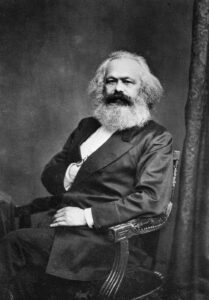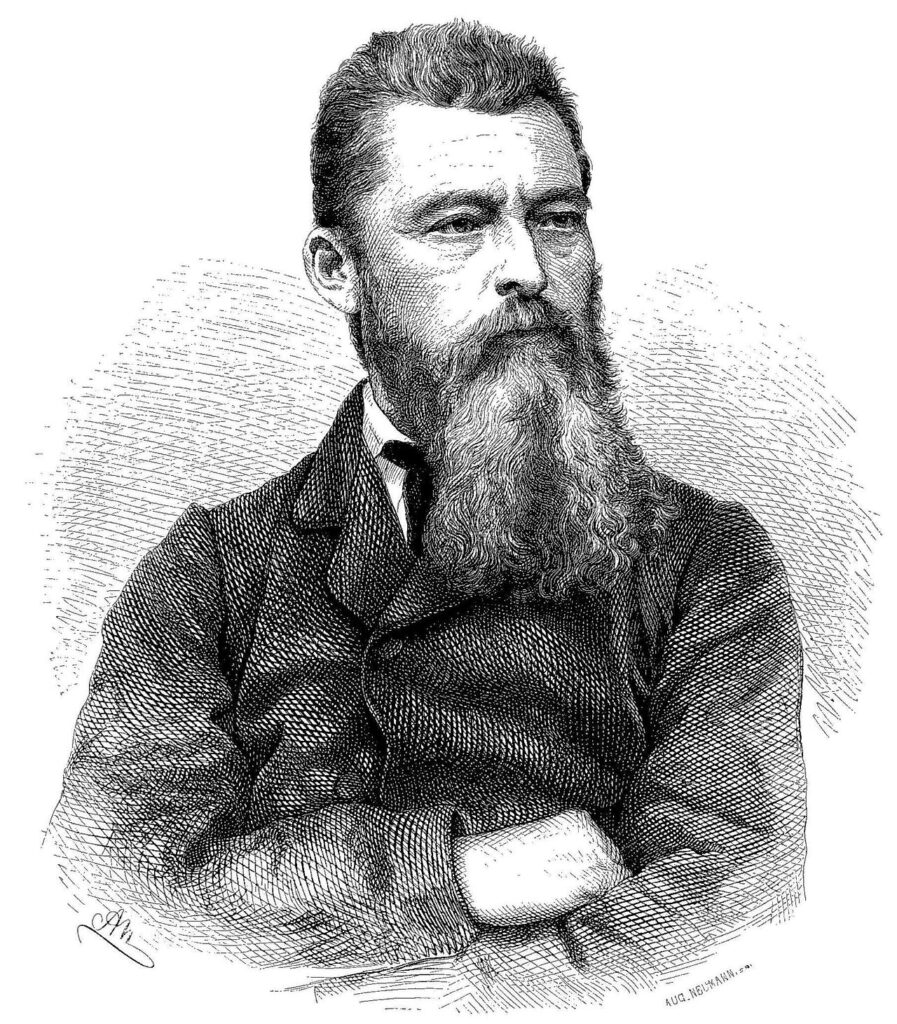The Theses on Feuerbach and modern Leftism.
Marx’s Theses on Feuerbach are one of the most useful texts for understanding his philosophical and revolutionary methodology. This is due to its being concise whilst also demonstrating the methodological approach in action. The theses are a collection of eleven criticisms of prior philosophy up to Feuerbach, with Marx clearly positioning himself as being the herald of a new dawn in human development. He clearly wrote this at a key point in his intellectual development with it demonstrating the importance of his practical materialist focus. The world is not to be changed through philosophy, but through revolutionary action.


Ludwig A. Feuerbach (1804-1872)
Marx’s eleven Theses on Feuerbach:
First thesis:
An intrinsic flaw in prior philosophic works is asserted, typically this follows the form of an inversion (we believe we are progressing but are in fact regressing, we thought that the answer was in developing more comprehensive ideas but these have led us further from the truth).
In the Hegelian tradition, particularly after its Marxist offshoot, this frequently appears as a criticism of objectivity. In other words, an object of knowledge such as an idea, is critiqued on the grounds of its lack of subjectivity. The aim being to overcome the objective by a rigorous development of the subjective.
Buried in here is an issue over the goal, the telos of thought and action. Where we are oriented toward ‘the wrong goal’ we work against ourselves and must adapt.
Since Marx’s materialism is initially directed against philosophy and religion it is easier to use them as examples. In the former, philosophers have sought to understand the world by creating objects of knowledge and abstractly manipulating them; in the latter, Christian theologians argue that God creates the world.
To Marx these are not only inadequate, they are false and inherently harmful. Philosophy and theology are both set as placing an erroneous value on abstraction to the poverty of the physical, they reject “revolutionary … practical-critical activity.” [1]
Part of Marx’s correction is to ensure that people alter their perception to see the world “as practice”. The person taking part in simple “human activity … objective activity” must make a qualitative transformation and instead perform “sensuous human activity”.
Second thesis:
Truth is then detached from those prior systems. For example, truth cannot be apprehended through philosophy or theology, instead truth must be apprehended through the practical. It is down to those holding the ideas to demonstrate their “truth”. It is quite clear that “power” is a core principle. Whether the ideas manifested into action are a success or not are the gauge of their power, their truth. It is only through the vehicle of physical practice that whether something is “real” or not can be demonstrated.
Third thesis:
The progression requires that people themselves are changed. The need is for academics to be instructed, who then teach progressively more students and yet-to-be teachers. It is through academia that revolutionary praxis (theory into action, which generates new theory and is converted into new action, ad nauseum) is established.
Earlier in the Theses on Feuerbach the criticism is levelled against a certain discipline and the knowledge being abstract, whereas here, Marx critiques society itself. Much like how he accuses established knowledge of being oriented towards false truths, society can also be false. The task is to break apart the processes which sustain the existing society and a key part of this is to establish at first in theory, a more ideal form of society. Revolutionary action is putting into effect this theory, it is the action and implementing it which demonstrates its truth. However, this change can only occur through revolutionary action, incidentally, sensuous human activity.
Note: a number of years prior to the Theses on Feuerbach Marx had made clear that this division of society into present and desired, was likewise bifurcated with emotion. He is quite clear that all evil must be concentrated onto existing society whilst at the same time all good is instrumentally located with the Revolutionary Society [2, pp. 137-142]. Revolutionaries need not feel guilt or have any qualms about overthrowing the old society, whilst at the same time they possess certainty of their own moral status.
Fourth thesis:
In this thesis Marx critiques Feuerbach, who had argued that God is a psychological projection out of our consciousness. Feuerbach after his negative critique had then sought a positive one in which divinity became relocated in the collective: “man with man … that is God” [3, p. §60] and that discovery “takes the place of religion” [3, p. §64]. Marx having a strict materialist position rejects Feuerbach’s philosophy becoming the basis of a new religion, since he sees it as maintaining the old issue by an alternative means. So, Marx set the two as being mutually exclusive, the theoretical destroys the materialistic and so the higher-society cannot be brought into existence. Instead, the future ought to be practical.
Fifth thesis:
Marx accuses Feuerbach of failing to grasp the importance of revolutionary action and that he commits a fundamental error. Note: how V parallels I.
Sixth thesis:
The critique now shifts to reform Feuerbach’s ideas. Marx argues that Feuerbach succeeds in realising that the true essence of religion is not God but is in humanity. However, this cannot merely be left as an abstraction, it must of course be made into practical reality by revolutionary practice which establishes the idea in existence and reveals the power of the idea and action, hence the truth of the matter. In order to make Feuerbach’s collective-human god more than an idea, Marx invests the system of social relations with this divinity. This is summarised as:
- A) Feuerbach re-establishes a contradiction between abstract idea of human divinity and the practical manifestation of human divinity.
- B) This reduces human divinity to the province of being a simple analytical category.
Seventh thesis:
The accusation is that Feuerbach failed to follow the line of reasoning to completion and so, Feuerbach misses Marx’s addition which is that: depending on the type of people you have you get different manifestations of religion. Different societies have different religions and to tie this in with the 3rd thesis, a higher society will have a higher religious manifestation which can be taught through academia.
Eighth thesis:
It is the physical world which is the essence of social existence and the relations therein. The means of resolving the problem of re-occurring abstraction is to implement revolutionary practice and to establish new theories based on this practice.
Ninth thesis:
Prior philosophic materialism, such as that of Feuerbach, does not yet move the world into a place of non-contradiction between people and the ideas that they hold. Nor does it then overcome civil society with a human society at the level of the species.
Tenth thesis:
The purpose of prior materialism is the erroneous goal of “civil society”, whereas Marx’s materialism is a qualitative change into a new form of society, viz-á-viz I-III, and which realises VI-VIII.
Eleventh thesis:
Philosophers once “interpreted” the world, now their duty is to reform it.
Theses on Feuerbach: Discussion
The Theses on Feuerbach clearly have a number of significant implications.
Marx sets out to establish an entirely new conception of reality and whilst in his view philosophy had utility in the past, it is to be replaced by revolutionary action. Other conceptions of existence, knowledge and ethics are treated as simplistic whereas his materialist conception is positioned as the highest. Truth is dependent on action, not on philosophy, so that ‘truth’ is only what occurs through the materialist worldview. This form of truth is recognised to be subjective, but it is taken as proven when the materialist worldview comes to exert power over existence.
The aim is to undo the distinction between abstract and materialist through revolutionary action.
The above are inculcated through education, be it academic or journalistic. People are taught that on the one hand there are simplistic abstract conceptions of existence, secondly, that there is a higher alternative. This higher alternative is realised (made into a physical reality) through revolutionary action.
Readers might note in the above the mechanistic model of historicism, that history has a purpose and is marching towards it. In Marx’s system he, like Hegel before him, subjectively decides on what that future state of existence ought to look like.
This is important because it establishes an academic monopoly over the ability to determine the pathway of human development. Hegelian academia is inquisitive insofar as they can take their ideas and turn them into directives which others must deliver. In other words, academicians develop complex theories which restrict people into being extensions of the Hegelian academic. The natural consequence of this is that there is a bifurcation in academia, society, culture which is aiming to reform reality. Under Marxian education this means that only certain educators and certain disciplines are considered to have legitimate knowledge or some semblance of the truth. The truth/legitimacy of the discipline or its teaching, stems from the materialist conception of existence and revolutionary action oriented to the subjectively selected historicist goal. The methodology by which knowledge is developed and what is considered to be knowledge, are made the sole province of Hegelian academics (naturally different offshoots will disagree on their version of the truth).
Pre-figured into this is the fact that you as an individual exist for a purpose, and that purpose is to establish this academically hypothesised reformation of existence and the superordinate society that needs to be brought into being.
This new academic process is also religious. Feuerbach argues that God was an idea, a psychological projection which we create, for him this means that God originates in the human. Marx describes how he lost belief in God and decided that “new gods had to be installed” [4, p. 18]. He states that he he arrived at Hegel’s process but with one additional step, which is that it had to be materialised through revolutionary action. In other words, like in Hegel’s philosophy god is constituted by humanity, but like Feuerbach god is in the collective; Marx materialises these two conceptions so that the Marxist collective embody divinity in their union with the material world, in the union of humanity with nature.
The Marxian form of academia indoctrinates students with the idea that history marches toward a known-end. It is the duty of all who receive the Promethean light of the revolutionary methodology from the Marxian academics, to herald and then usher in this future in which the revolutionary collective undergoes a collective apotheosis and becomes divine (“man is the supreme being for man” [2, pp. 137, 142 see also 131]). Under Marx’s materialist reformation of reality, theology is replaced by social science and the academy becomes a neo-seminary. It is in the neo-seminary that the correct action, knowledge and truths are conveyed to adepts.
Science is here a method for developing peoples’ consciousness toward the end-goal of Marx’s system; the person who undergoes the scientific process is moved from being crude and simple, to being superior. Their duty then becomes the manifestation of the higher reality and its corresponding ‘human society’. With Hegelian science, the form of religious consciousness and all reality is likewise transformed.
Conclusion
Marx’s Theses on Feuerbach are incredibly useful for understanding the thought which governs Marxist philosophy, revolutionary practice and the later philosophical modifications of Marx’s philosophy and praxis. Within the theses we can see the very movement of the dialectic in action through the critique of Feuerbach. The critique reveals contradictions which must be dialectically brought into harmony and thus create a synthesis. Whilst past syntheses have taken place through abstraction in philosophy, the primary synthesis established by Marx is through materialism. This requires the negation of past abstractions and to then replace philosophical labour with practical labour, that practical labour being the positive movement of ideas which are based on material reality. The task of the materialist collective being to take the abstract Hegelian form of divinity (the philsophic-god of the Absolute Idea) and materialise it, manifesting the divine dialectical collective which restlessly self-creates and reforms its consciousness.
The requirement for revolutionary action does not simply upend society and the political landscape, but reforms existence in its entirety. Through a sequence of historicist steps, the person is dialectically led to a reformed conceptualisation of existence, a new means of developing knowledge and socially constructing ‘truth’, with a corresponding system of ethics and sense of beauty, complete with a new subject-object to worship: humanity-nature. It demands nothing less than a revolution from reality itself.
A number of quotes by Marxian intellectuals on the religious aspects of Marxist socialis are available in my book The Revolutionary Renaissance, some of which can be seen here.
Works Cited
| [1] | K. Marx and F. Engels, “Theses on Feuerbach,” in The German Ideology Parts I & III, Mansfield Centre, Martino Fine Books, 2011, pp. 197-199. A version can be found on marxists.org |
| [2] | K. Marx, J. J. O’Malley and A. Jolin, Critique of Hegel’s ‘Philosophy of Right’, Cambridge: Cambridge University Press, 2009. |
| [3] | L. Feuerbach, Principles of Philosophy of the Future, 1843. |
| [4] | K. Marx, Collected Works: 1835-1843, vol. 1, London: Lawrence & Wishart, 2010. |


